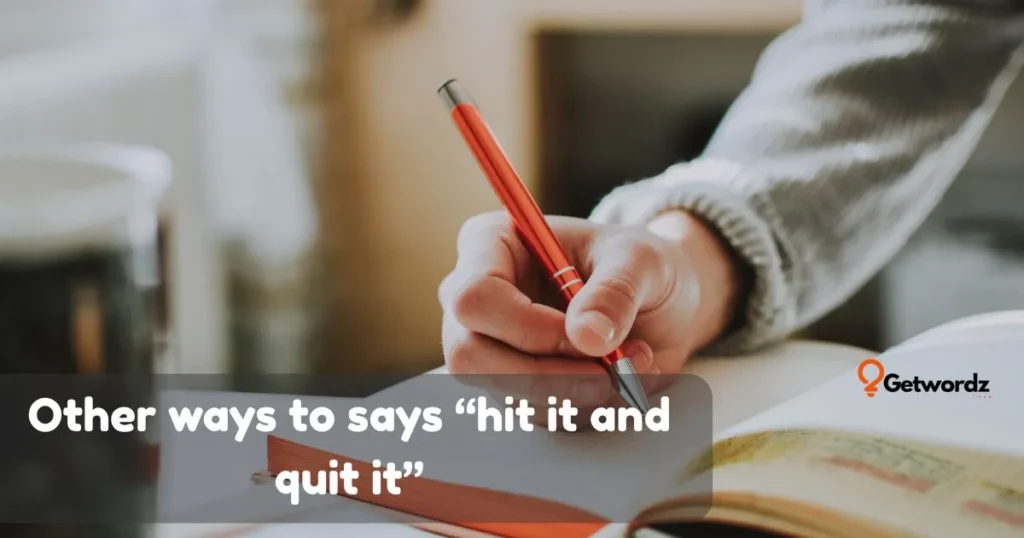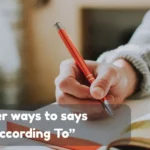Hit it and quit it is a bold slang expression often used to describe a brief, no-strings-attached encounter whether in romance, humor, or casual conversation. While it’s catchy and direct, using this phrase too often can sound repetitive or even inappropriate depending on the context.
That’s exactly why people look for different ways to say hit it and quit it to sound more creative, expressive, or subtle in different situations.
Whether you’re joking around with friends, chatting with a partner, or writing dialogue that feels authentic and witty, knowing some unique alternatives to this phrase can help you express the same idea with a fresh twist.
From funny and flirty to clever and classy, there are many ways to convey that short and done vibe without relying on the same old saying.
In this post, we’ll explore creative alternatives, better wording, and funny expressions that capture the meaning of hit it and quit it with more originality and flair. Ready to spice up your vocabulary and surprise your audience? Let’s dive in and discover the perfect phrase that fits your tone and intent.
1. One and Done
Scenario: Picture someone wrapping up a short fling or project with no plans to revisit it. This phrase fits perfectly when the moment is brief but complete.
Explanation: “One and done” is a casual and confident alternative to hit it and quit it. It means something was completed in one go, often used humorously or with a no-attachment tone.
Examples:
- “We went out once. One and done.”
- “He tried that idea at work, one and done.”
- “That date? Definitely one and done.”
Why It Works: This phrase is short, punchy, and versatile. It sounds clean, casual, and expressive without being too bold or inappropriate.
2. In and Out
Scenario: When someone completes something quickly or wants minimal involvement, “in and out” captures that swift attitude.
Explanation: This simple expression highlights quick action and efficiency, making it a cleaner way to say hit it and quit it in both romantic and general contexts.
Examples:
- “He was in and out before the meeting even started.”
- “That’s an in and out situation, no strings attached.”
- “She handled it fast, in and out.”
Why It Works: It’s universally understood and flexible, balancing wit with simplicity.
3. A Quick Fling
Scenario: You’re chatting with friends about a brief romantic encounter that didn’t go anywhere serious.
Explanation: “A quick fling” is a friendly, casual expression that describes short-lived chemistry. It’s a creative alternative that replaces bluntness with a softer tone.
Examples:
- “It wasn’t serious, just a quick fling.”
- “We had a quick fling last summer.”
- “Nothing deep, just a quick fling.”
Why It Works: It’s socially acceptable and relatable, perfect for conversations or storytelling.
4. Short and Sweet
Scenario: When something ends quickly but pleasantly, this phrase captures that perfect balance.
Explanation: “Short and sweet” is a positive, light-hearted alternative that works in romantic or casual situations. It signals brevity without negativity.
Examples:
- “Our time together was short and sweet.”
- “The meeting was short and sweet, just how I like it.”
- “That vacation was short and sweet but worth it.”
Why It Works: It’s polite, charming, and adds emotional warmth to a quick goodbye or closure.
5. Here for a Good Time
Scenario: Imagine a carefree weekend trip or a fun encounter where someone’s just living in the moment.
Explanation: This playful phrase means enjoying the present without long-term commitment, a fun and natural alternative to hit it and quit it.
Examples:
- “I’m here for a good time, not a long time.”
- “He’s just here for a good time.”
- “It’s all about enjoying the moment.”
Why It Works: It’s flirty, fun, and socially accepted across casual conversations and captions.
6. No Strings Attached
Scenario: When both people want something casual and uncomplicated.
Explanation: “No strings attached” clearly expresses a mutual, no-commitment agreement, a respectful way to say hit it and quit it without harshness.
Examples:
- “We agreed, no strings attached.”
- “It’s just fun, no strings attached.”
- “That was the deal from the start.”
Why It Works: It sounds honest and clear, making intentions transparent while keeping the tone friendly.
Read More: 30 Other ways to say “According To” with Examples!
7. Just Passing Through
Scenario: Someone experiences a fleeting connection but knows it’s temporary.
Explanation: “Just passing through” adds depth and reflection to a short encounter, ideal for those who want a gentler, emotional variation of hit it and quit it.
Examples:
- “He was just passing through my life.”
- “It felt special, but I was just passing through.”
- “Sometimes, people are meant to pass through, not stay.”
Why It Works: It blends emotion with realism, perfect for reflective storytelling or writing.
8. Done and Dusted
Scenario: After completing something swiftly, be it a date, task, or favor, you move on.
Explanation: “Done and dusted” is a British-inspired alternative meaning something is completely finished. It’s witty and non-romantic but adaptable.
Examples:
- “That’s done and dusted.”
- “We tried once, done and dusted.”
- “The deal? Done and dusted.”
Why It Works: It’s polished, flexible, and perfect for both formal and casual tones.
9. A Brief Encounter
Scenario: You meet someone unexpectedly, share a spark, and move on.
Explanation: “A brief encounter” sounds romantic yet sophisticated, offering a classy replacement for hit it and quit it.
Examples:
- “It was just a brief encounter, nothing more.”
- “We had a brief encounter that felt cinematic.”
- “Some moments are meant to stay brief.”
Why It Works: It feels mature, emotional, and respectful, ideal for storytelling or reflection.
10. Love and Leave
Scenario: Someone enjoys a fling and walks away with no drama.
Explanation: “Love and leave” is a playful rhyming alternative that mirrors hit it and quit it but with rhythm and charm.
Examples:
- “He’s known to love and leave.”
- “I didn’t mean to love and leave.”
- “It was a love and leave situation.”
Why It Works: The rhyme makes it memorable and catchy, great for humor, lyrics, or casual talk.
11. A Moment in Time
Scenario: Think of those fleeting moments when you meet someone special, but life moves on too quickly for anything lasting.
Explanation: “A moment in time” is a gentle and poetic alternative to hit it and quit it. It conveys temporary connection without the bluntness or slang, making it suitable for storytelling or reflection.
Examples:
- “It was just a moment in time, but it felt real.”
- “Some people are only meant to be a moment in time.”
- “We shared a smile, a moment in time, and moved on.”
Why It Works: This phrase is emotional, mature, and reflective. It softens the meaning while keeping authenticity and relatability.
12. Quick Spark
Scenario: When two people feel instant chemistry that fades just as fast, “quick spark” fits perfectly.
Explanation: “Quick spark” is a fun, flirty, and modern expression that captures instant attraction without long-term expectations. It’s a creative alternative to hit it and quit it for social or romantic contexts.
Examples:
- “We had a quick spark, that’s all.”
- “It was just a quick spark moment.”
- “A quick spark, no flames, no fire.”
Why It Works: It’s casual, lighthearted, and versatile, ideal for friendly or romantic conversations without sounding harsh.
13. Short Ride
Scenario: You start something exciting that ends before it really begins.
Explanation: “Short ride” conveys a brief experience with a sense of motion and energy. It’s a colloquial alternative to hit it and quit it used in both personal and humorous contexts.
Examples:
- “It was a short ride but a fun one.”
- “That relationship? Short ride, no regrets.”
- “Sometimes, a short ride is all you need.”
Why It Works: It feels spontaneous and relatable, making it a great conversational phrase.
14. Fleeting Flame
Scenario: A spark ignites fast and fades away just as quickly.
Explanation: “Fleeting flame” is a romantic yet bittersweet expression, perfect for describing temporary passion or interest.
Examples:
- “Ours was a fleeting flame.”
- “A fleeting flame burned bright for a moment.”
- “Love was there, but it was a fleeting flame.”
Why It Works: The imagery makes it emotionally appealing and poetic, a refined choice for storytelling.
15. Fast Affair
Scenario: When you want to describe a brief relationship that burned hot and ended quickly.
Explanation: “Fast affair” is a bold and descriptive alternative, showing speed and intensity without sounding crude.
Examples:
- “They had a fast affair last summer.”
- “It was a fast affair, over before it began.”
- “A fast affair that left no marks.
Why It Works: It captures passion and brevity together, fitting for casual or dramatic storytelling.
16. Blink and Miss It
Scenario: Something happens so fast you barely notice it—whether a date, connection, or meeting.
Explanation: “Blink and miss it” is a funny, idiomatic alternative that works for light and casual situations.
Examples:
- “That date was blink and miss.”
- “Our connection was blink and we missed it quickly.”
- “It all happened in a blink and miss it way.”
Why It Works: It’s humorous, catchy, and perfect for informal conversations or captions.
17. Whirlwind Moment
Scenario: A sudden burst of excitement or romance that ends just as fast.
Explanation: “Whirlwind moment” is a vivid expression that implies intensity and speed, often used to describe exciting but short-lived experiences.
Examples:
- “We had a whirlwind moment.”
- “It was a whirlwind moment, fun while it lasted.”
- “That weekend felt like a whirlwind moment.”
Why It Works: It sounds energetic and cinematic, appealing to a wide audience.
18. Short-Lived Spark
Scenario: Two people connect quickly, but it fades naturally.
Explanation: “Short-lived spark” conveys fleeting chemistry or excitement that didn’t turn into something long-term.
Examples:
- “Ours was a short-lived spark.”
- “A short-lived spark, nothing more.”
- “It started fast, but it was short-lived.”
Why It Works: It’s direct yet gentle, making it a respectful and clear expression.
19. Casual Encounter
Scenario: When someone describes a relaxed, low-pressure meeting or connection.
Explanation: “Casual encounter” is a neutral and socially recognized term that fits various tones, friendly, flirty, or matter-of-fact.
Examples:
- “It was just a casual encounter.”
- “We had a casual encounter, no expectations.”
- “Sometimes casual encounters are the most fun.”
Why It Works: It’s safe, neutral, and widely understood, making it a go-to alternative for many contexts.
20. Quick Connection
Scenario: You meet someone and instantly click, even if it doesn’t last long.
Explanation: “Quick connection” is a positive, friendly way to describe instant rapport without long-term implications.
Examples:
- “We had a quick connection but moved on.”
- “It felt right, just a quick connection.”
- “Quick connections can be meaningful too.”
Why It Works: It’s upbeat and suitable for both professional and personal use.
21. Flash Romance
Scenario: A spark of love that flares up and vanishes quickly.
Explanation: “Flash romance” is a creative, modern phrase for describing a rapid, exciting, and short-lived relationship.
Examples:
- “It was a flash romance from start to finish.”
- “We shared a flash romance that burned out fast.”
- “A flash romance, unforgettable but brief.”
Why It Works: It’s visual, trendy, and emotionally charged—ideal for storytelling or captions.
22. One-Night Story
Scenario: When you want to describe a single encounter with narrative flair.
Explanation: “One-night story” adds a playful twist to the idea of a one-night event, making it sound lighter and more personal.
Examples:
- “It was just a one-night story.”
- “Every one-night story has its charm.”
- “We laughed, talked, and ended our one-night story.”
Why It Works: It’s romantic yet casual, turning a common experience into a memorable phrase.
23. Hit and Run
Scenario: Someone makes a quick appearance and disappears again.
Explanation: “Hit and run” is a slang-driven, bold alternative to hit it and quit it, but it can be used humorously in many situations.
Examples:
- “That was a hit and run date.”
- “He’s famous for his hit and run flings.”
- “Work project? Total hit and run.”
Why It Works: It’s catchy, edgy, and playful, perfect for informal speech.
24. Lightning Romance
Scenario: A sudden romantic spark that strikes hard and fast.
Explanation: “Lightning romance” symbolizes instant attraction and intensity, similar to hit it and quit it but with a magical tone.
Examples:
- “We had a lightning romance that faded quickly.”
- “It struck fast, a real lightning romance.”
- “Some loves are lightning romances.”
Why It Works: It’s emotional and poetic, suitable for writing or storytelling.
25. Quick Fix
Scenario: When someone seeks instant satisfaction or a temporary solution.
Explanation: “Quick fix” is a universal expression that implies solving something fast, often used playfully in romantic or casual settings.
Examples:
- “He was just a quick fix.”
- “Sometimes you need a quick fix for your loneliness.”
- “It was a quick fix, not a forever thing.”
Why It Works: It’s familiar, flexible, and easily understood across audiences.
26. One-Time Thing
Scenario: When someone wants to clarify that an experience won’t happen again.
Explanation: “One-time thing” is a clear, straightforward phrase that removes ambiguity while staying polite.
Examples:
- “It was a one-time thing, no hard feelings.”
- “That was a one-time thing, we moved on.”
- “He knew it was a one-time thing.”
Why It Works: It’s easy to say, nonjudgmental, and suits most casual tones.
27. Blink of an Eye
Scenario: Something happens before you even realize it.
Explanation: “Blink of an eye” is a figurative expression for something quick or fleeting, great for both emotional and humorous contexts.
Examples:
- “It was over in the blink of an eye.”
- “Our connection disappeared in the blink of an eye.”
- “Life changes in a blink of an eye.”
Why It Works: It’s poetic, natural, and timeless, perfect for writing or conversation.
28. Quick Escape
Scenario: When someone leaves fast after getting what they wanted.
Explanation: “Quick escape” is a playful yet assertive phrase, showing a fast exit or withdrawal from any situation.
Examples:
- “He made a quick escape after the date.”
- “A quick escape was all I needed.”
- “Sometimes, a quick escape saves the day.”
Why It Works: It’s witty, flexible, and gives action-driven imagery that readers enjoy.
Read More: 30 Other Ways to say “I Believe in You” with Examples!
29. Brief Connection
Scenario: You meet, connect, and part ways naturally.
Explanation: “Brief connection” conveys warmth and realism without the blunt tone of hit it and quit it.
Examples:
- “We shared a brief connection.”
- “It was a brief connection that mattered.”
- “Sometimes brief connections teach the best lessons.
Why It Works: It’s thoughtful, emotionally intelligent, and ideal for mature conversations.
30. One for the Memory
Scenario: You experience something short but memorable.
Explanation: “One for the memory” is a sentimental phrase that gives a positive spin to short-lived moments.
Examples:
- “That night was one for the memory.”
- “A quick encounter, but one for the memory.”
- “We both knew it was one for the memory.”
Why It Works: It’s nostalgic, meaningful, and adds heart to any short story or connection.
Pros✅and Cons❌of the Keyword Hit It and Quit It
Pros✅
- 💬 Catchy and Memorable: The phrase is short, direct, and easy to remember, making it stand out in speech and writing.
- 😎 Cultural Relevance: Commonly used in pop culture, music, and casual talk, which helps connect with younger audiences.
- 🗣️ Expressive Tone: It conveys strong intent and emotion, instantly setting the mood or attitude of a sentence.
- ✍️ Versatile Use: Can be applied to romantic, humorous, or even task-related situations in creative writing.
- 📈 SEO Potential: As a trending slang term, it attracts search traffic and boosts engagement for blogs discussing modern language.
Cons❌
- ⚠️ Informal or Slang-Based: The phrase can sound too casual or inappropriate in professional or formal settings.
- 🚫 Negative Connotation: It often implies carelessness or lack of commitment, which may not suit all audiences.
- 🧩 Limited Contexts: Its meaning is highly specific, making it hard to use naturally in varied topics.
- ❗ Cultural Misunderstanding: Some readers may misinterpret it due to cultural or regional differences.
- 🕵️ Content Sensitivity: Overuse or misuse can affect tone and may not align with all website or brand voices.
Closing words
Finding the right words to replace hit it and quit it can make your conversations sound more natural, respectful, and creative. This post shared fresh alternatives, unique expressions, and better wording choices that help you avoid repetitive slang while keeping your message authentic and engaging.
You can use these creative alternatives in different settings, whether chatting with friends, writing a funny social post, or expressing something casual in a lighthearted text. Each phrase offers a new way to say what you mean with style and confidence.
So next time, try one of these phrases to keep your communication smart and expressive. Choosing thoughtful wording shows originality, warmth, and clarity. Keep experimenting with these creative options to elevate how you use it and quit it in everyday language.




